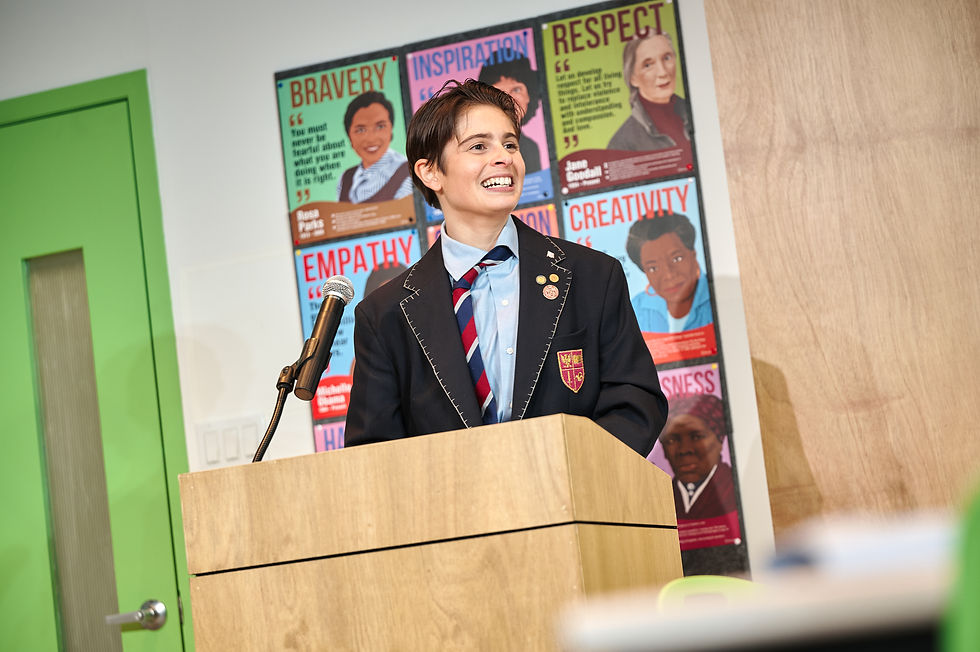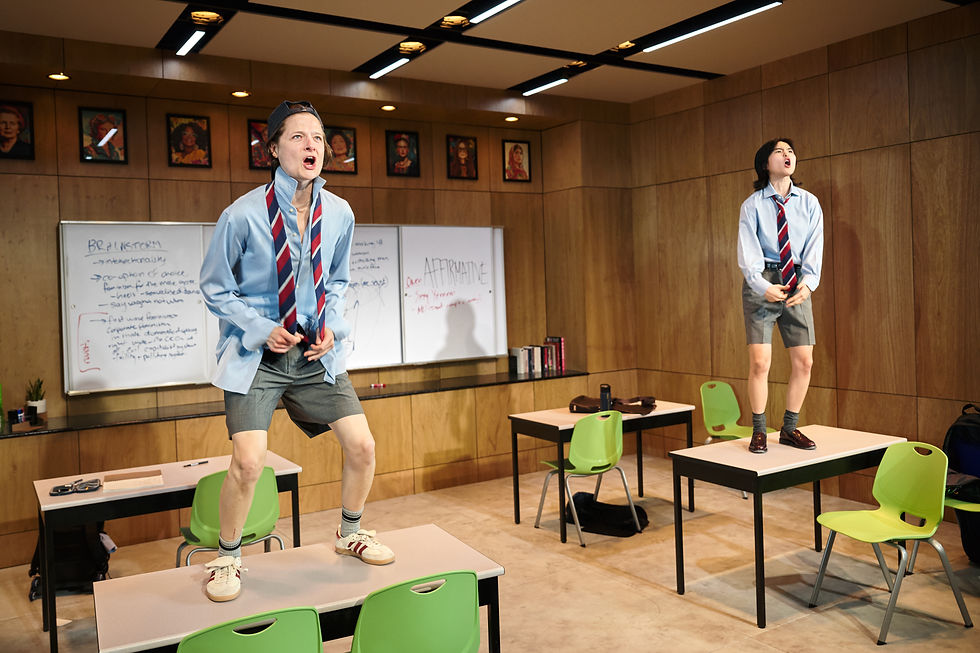School Camp
- Jonathan Kalb
- Jul 14, 2025
- 5 min read

Emmanuelle Mattana’s Trophy Boys is a cheeky debut play that’s a lot of fun to watch, even if it doesn’t feel fully realized. It has excellent actors and a wonderfully nervy premise: privileged private school boys are assigned to argue that “feminism has failed women” in a high-stakes debate team final against their sister school. The drama is intelligent, exciting and brave for about half of its 75 minutes and then loses its nerve, turning its smart and nuanced ideas about feminism into red herrings in a bait-and-switch. What seemed complex abruptly devolves into stock backbiting among the boys.
Mattana is a queer, 24-year-old Australian who starred in the original Australian version of this play and also stars in this American premiere directed by Danya Taymor at MCC Theater. The work’s overt theatricalism is its most interesting dimension. All four boys are played by female or gender non-conforming actors, which makes gender very plainly a matter of choice and performance. The tricky debate topic exposes the blind spots in the boys’ nascent conceptions of masculinity, and the drag performances magnify that with camp and caricature.
Watching the talented cast’s perceptive sendups of adolescent male types is delightful. The only fly in that ointment is that characters so young and conventionally conceived have only a few blind spots worth framing. At the point that one boy has repeated “I love women” fourteen times the obvious joke has more than worn out its welcome.
The setting (designed by Matt Saunders) is a classroom at the girls’ school where the boys are secluded for a one-hour prep session before the debate. The walls are adorned with posters of female luminaries such as Oprah, RBG, Amelia Earhart, Frida Kahlo, and Margaret Thatcher, all of whom the boys claim to revere because they consider themselves liberal feminists—they’re the “girl-bosses of history.” But these boys are also very ambitious, image-conscious, and variously entitled, expecting places at top colleges and sterling careers, so this debate assignment poses a reputational threat to them. How can they argue against feminism without looking like jerks?
The boys’ types are made visible in the different states of array and disarray of their prep school uniforms. Owen, played with genial hauteur by Mattana, is the buttoned-up kingpin wearing his immaculate logoed blazer like a tortoise shell. He’s an insufferably confident scholarship boy who wants to be President, knows he’s smarter than everyone else, and expects them to take his lead. The funniest moment with this self-serious kid comes when, during the first of several surreal interludes when the boys briefly show their hormone-crazed ids by humping chairs, tables and books, he rips off his school shirt only to reveal another, identical shirt beneath. (Taymor has a great feel for the crazed sequences; teenage id is her wheelhouse.)

Jared is the tall, handsome, rich “soft-boy jock” who loves his mom, wants to be an artist, and can’t be bothered to button his shirt let alone wear a jacket with his backward ball cap. Louisa Jacobson plays him with a dangly-armed swagger that nails both his laid-back conceit and his dopey earnestness.
Scott is Jared’s best bro—a passionate kid who doesn’t know his own strength and can’t decide if he wants to be Jared or fuck him. Esco Jouléy, very buff and tattooed and showing a lot of skin, wears a school tie over a tank top, poignantly evoking this boy’s perplexed mix of nonchalant carelessness and homoerotic daring.
The quietest, and smallest team member is David, whom everyone suspects is an incel and whose wildest rebellion is a loosened tie. Terry Hu plays him as a sly, opportunistic lurker who secretly believes he’s just as smart as Owen and watches for the right moment to challenge him.

What happens is that the boys’ prep session is waylaid by an anonymous online allegation of sexual assault against one of them (which they shouldn’t have seen because internet is forbidden). No evidence or details are provided and the charge may be a strategic attempt to distract them, or to reveal they were cheating. Nevertheless, the group sinks into a panic, knowing the student audience will have seen the post and its responses before the event begins. From then on, they worry about nothing but their reputations.
They turn on each other. Feminism is forgotten and all that matters is cancel culture, fear of entrapment, and protection of status. Trophy Boys starts to feel a lot more like an episode of Survivor than a probing meditation on feminism.
Some, I’m sure, will find it amusing to follow the boys’ nastiness toward one another in all its particulars as they descend into naked self-interest and scapegoating. Others may feel inclined to twist what happens into an obliquely feminist statement about how spectacularly ruthless even supposedly liberal boys can be (as if girls wouldn’t be just as cruel to one another if faced with a comparable dilemma).
Mattana articulates the true emphasis of the play in an interesting program note that describes competitive debate (which she participated in during high school) as a fundamentally pernicious activity that devalues truth and rewards amoral, purely instrumental argument:
the very nature of the endeavor—turning argument into sport while believing yourself the smartest in any room—required you fervently argue things you didn’t know enough about or even necessarily believe. Logic was a game, something to be won or lost, and words and arguments were things you could twist at your own whim. If you were articulate and commanding enough you could speak over anyone, or for anyone.
In the end, the boys implausibly just let go of all worries related to facts, truth, what any of them may or may not have done to girls, and their lack of prepared arguments because they squandered the whole hour. They believe they can still win the trophy because, as Owen says, “It’s not a real argument, just a game.” His advice: “Be more commanding, more convincing, more articulate. Go out there and make something up. That’s what we’ve been learning to do this whole time anyway.”
Up to that point, I’d actually been thinking that the play was a bit dated, for all its hip slang and pop cult references, a little too 2017 with its boys consumed with panic over cancellation and allegations of sexual misbehavior. Haven’t we now entered the exponentially worse world of Trump II where shamelessness and impunity rule, shared facts are a sentimental memory, and no accusation can reliably stick or matter? I couldn’t have been more wrong. The simple and evasive ending of Trophy Boys is as timely as it gets.
By Emmanuelle Mattana
Directed by Danya Taymor
MCC Theater




Comments